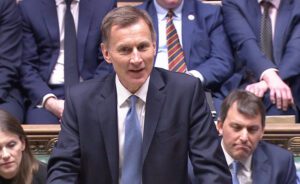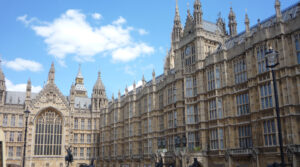Lower government provides Hunt room in spring budget for tax cuts

<?xml encoding=”utf-8″ ?????????>
The UK government borrowed £5 billion less than expected by the Office for Budget Responsibility in the year so far to December, raising the chances of the chancellor cutting taxes at the budget on March 6.
The government borrowed £119.1 billion in the nine months to December, according to the Office for National Statistics, lower than the £124.1 billion projected by the OBR at the autumn statement in November.
In December alone, borrowing hit £7.8 billion, much lower than the £11 billion forecast by City analysts and the weakest amount in five years.
Smaller-than-expected government spending of £86.1 billion last month narrowed the deficit, which is the difference between what a government spends and what it generates in tax revenues. Debt interest spending also fell sharply to £4 billion, down by £14.1 billion compared with December 2022, reflecting lower inflation and market interest rate expectations.
Laura Trott, chief secretary to the Treasury, said government support to cushion the cost of living was necessary, but added that “it is right that we pay back these debts so future generations are not left to pick up the tab”.
Government tax revenues have surged over the past year as a result of the decision by the chancellor, Jeremy Hunt, and the prime minister, Rishi Sunak, to freeze a range of tax thresholds amid a period of record wage inflation, a process known as a “fiscal drag”. A rise in the rate of corporation tax to 25 per cent has also lifted tax revenues from the private sector.
Hunt is anticipated to have between £15 billion and £20 billion to spend at the next budget, which could be the final fiscal event before a likely autumn general election.
Since the OBR’s latest forecasts in November, which accompanied the autumn statement, inflation has fallen much faster than anticipated, down to 4 per cent in December. As a result, financial markets have priced in several interest rate cuts by the Bank of England over the next 12 months.
In November, Hunt cut national insurance by 2p and made the 100 per cent capital spending allowance permanent at a cost of £20 billion. He is considering lowering income tax, national insurance contributions or inheritance tax at the next budget.
Mounting expectations for interest rate cuts have put downward pressure on yields in government bond markets, relieving the burden on the public finances from the UK’s debt stock.
Under the UK’s current fiscal rules, the chancellor is required to ensure debt as a share of gross domestic product is falling and annual borrowing is capped at 3 per cent of output in five years. Hunt is projected to have an additional £15 billion to £20 billion of headroom against this measure as a result of lower market rate expectations, weaker inflation and stronger growth.
Britain’s debt stock as a share of GDP is still high by historical standards at 97.7 per cent, the highest since the 1960s.
The public finances are much more exposed to changes in official interest rates as a result of the Bank of England compensating commercial banks’ deposits in full at the UK base rate level, which currently stands at a 15-year high of 5.25 per cent.
Andrew Bailey, the governor of the Bank of England, and the monetary policy committee are forecast to leave the base rate unchanged next Thursday and upgrade their projections for the UK economy over the coming years.
Ruth Gregory, deputy chief UK Economist at Capital Economics, said: “December’s better-than-expected public finances figures brought some cheer for the chancellor … and will give him a bit more wiggle room for a big pre-election splash in the spring budget.”
She said he could launch several “crowd-pleasing measures, such as a 1p cut to income tax (costing £6.9 billion a year), while still maintaining fiscally prudent appearances”.
Samuel Tombs, chief UK economist at Pantheon Macroeconomics, said “falling interest payments create scope for tax cuts which the gilt market can tolerate”. However, Michal Stelmach, senior economist at KPMG UK, cautioned that the “fiscal outlook is riddled with uncertainty”.
Substantial tax cuts would, in theory, boost demand in the UK economy by raising households’ take home pay. As a result, there is a risk that they prompt the Bank of England to delay interest rate cuts this year.




